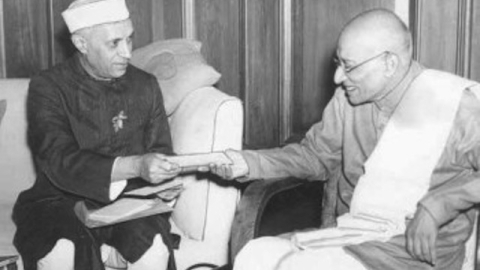 These are days of catch phrases. Nationalism is one such and the national soldier, the future citizen of a free India is but election folder. There is a crop of movements calculated to bring freedom for our country and one such is the movement for a national language.
These are days of catch phrases. Nationalism is one such and the national soldier, the future citizen of a free India is but election folder. There is a crop of movements calculated to bring freedom for our country and one such is the movement for a national language.
One does not clearly understand what is meant by the talk of a national language. Mr. C. Rajagopalachairar, the protagonist of the movement in the south, would have it as the State language for future India. He says, “The intelligentsia of India must therefore undertake the duty of carrying out the will of the people and manage central affairs as well as provincial matters.” He asks, “Can the deliberations of the Central Assembly and the transactions of the high officers of state and others exercising authority in the central government be permitted to be done in English?” And in answer he says “obviously not, if we desire democracy to be true in fact as well as in form – if we do not want educated men to be appointed to places of power and influence and conduct their affairs apart from the people and the electorate”. In his scheme of nationalism and democracy, there is place for the mother tongues as well as for English which latter he calls the language of international commerce.
This argument is high sounding, but one does not understand as to what it leads to excepting the enforcement of Hindi on South Indians. Mr. Rajagopalachariar refers to the Nehru Constitution, which is vague and grotesque, complex in its provisions relating to the lingua franca. There is place for Hindi and Urdu and also English in the Nehru millennium.
Let us now consider the argument put forth in favour of a language of state, calculated to establish democracy in fact as well as in form. First of all, democracy is said to be the rule by the intelligentsia. The intelligentsia everywhere and much more so in our country vigorously exploit the people in the interest of the classes to which they belong. For democracy to be real, therefore, the people at large should participate in the Government. An illiterate population is unfit for democracy. The task before the Nation-builder is therefore mass education and the eradication of illiteracy. As long as we accede the necessity for the study of three languages on the part of anyone aspiring to participate in the government of his country, you only extend the period of exploitation and unscrupulousness on the part of the intelligentsia.
If illiteracy is to be obliterated among the people, the advocacy of the study of three languages is a menace. There must be one common language for the classes and the masses alike which will completely satisfy our secular needs. The problem of the multiplicity of scripts must also be tackled. There is no necessity for so many scripts while the genius of all the scripts in the country employed in uniting the different languages is the same. The scripts of all of them are unscientific. They share the complexity of the picture scripts without their art and the multiplicity of all primitive inventions. The languages have a tendency to multiply even in this age of quick locomotion and news transmission because of our devotion for the mother tongues, sister tongues, king’s tongues and international tongues. In a perfect scheme of democracy therefore there is no place for so many tongues. If illiteracy is to be removed, the “Divine Nagari” and the “holy Arabic” scripts cannot be of any use. We must agree on the adoption of universal script so scientifically revised that one can learn it in a few hours time. The feat is not impossible.
We should build up a language which will be a synthesis of all the Indian languages but devoid of the confusing complexity of their grammar. As a first step we should decide on the adoption of universal script capable of writing down all the existing Indian languages. We should start and persistently push forward a movement for the attainment of common language in the near nature. The common language will be ushered in by a process of gradual evolution. No existing language however “national” its pretensions, will be suitable as the common language for the future.
(From 'Revolt' weekly magazine, 13 February 1929)
You can send your articles to This email address is being protected from spambots. You need JavaScript enabled to view it.

